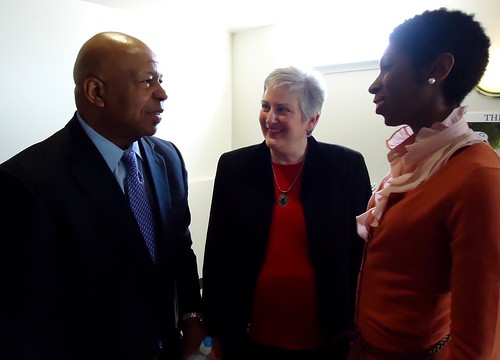Last week, Community Schools advocates packed City Council chambers for an Education Committee hearing about cuts to the initiative proposed in next year’s city budget. Greater Homewood Voices just caught up with one of those who spoke out in support of Community Schools at the hearing: Gia Grier McGinnis, Assistant Director with the Johns Hopkins University Center for Social Concern.
The Community Schools initiative requires an investment of just over $1 million in public funding through the Family League of Baltimore City each year. Full-time Site Coordinators at Community Schools leverage that investment to bring the goodness of the community into the school, netting $8.5 million in enrichment services to address students' real-life needs. These services range from health screenings to dance classes to after-school tutoring, and they help children thrive personally and academically. GHCC manages three Community Schools in Greater Homewood: Barclay, Guilford, and Waverly Elementary/Middle Schools.
GHV: Tell us a little bit about your role with JHU and the relationship the Center for Social Concern has with GHCC's Community Schools.
Gia: The Center for Social Concern (CSC) is the main hub for direct service to Baltimore City on the JHU Homewood campus. We have 30 programs that work with youth in Baltimore City Public Schools, with a concentration of programs at two GHCC Community Schools: Barclay and Waverly Elementary/Middle Schools. Programs at those schools include dance, Girl Scouts, soccer, creative writing, computer literacy, cooking classes, health education, and environmental education.
Students at Margaret Brent Elementary/Middle School in Charles Village participating in an after-school ballet program sponsored by the JHU Center for Social Concern.
GHV: What inspires you about these partnerships? What are some of the mutual benefits to the kids and the JHU students?
Gia: What I love about these community-campus collaborations is the significant learning and growing that happens on both sides of the program. Our students may not come in knowing much about Baltimore or working in a public school system, but have a wonderful talent they want to share. The students benefit by learning something new, and also by meeting a younger adult who can talk with them about their travels, organically learn about one another's cultures (for example, we have a larger Asian population than other campuses of our size), and what college is like. I think the experiences are eye-opening for all involved.
JHU Soccer Kids program at Waverly Elementary/Middle School
GHV: Why do you think community schools are important to Baltimore? What would happen to the programs the CSC supports if Community Schools funding went away?
Gia: The Community School resource takes a lot of pressure off of principals to budget time and funds for afterschool programming and other enrichment programs, especially in tight economic times. If Community Schools funding went away, I wouldn't say all of our programs would disappear, but I envision us having to scale back on how many programs we have at any one school. Right now student groups are asking to expand—we would not encourage that in any way if the proper supports (in this case, Community Schools) were not in place.
GHV: How did it feel to attend the Education Committee hearing last week and testify in support of an initiative you believe in?
Gia: I was very moved by the other panelists—there was a lot of passion in the room for this issue. I think we all feel this is important and should (hopefully) be a no-brainer for the City Council. The chambers were packed with supporters wearing red to show their support. One of the Council members remarked to me before the hearing that the usual crowd at these hearings is about 15 people, so the turnout should tell them something!
GHV: What did you tell City Council, and what do you think is important for everyone to know about Community Schools, especially as our elected officials near a decision on next year's budget?
Gia: Schools without this resource may leverage programs, but at a much slower rate and they struggle to do so consistently. Being able to reach out to GHCC’s Community School Site Coordinators has made things much easier for our office in terms of program allocation and management. I think an important point that several people echoed is that having a Community School Site Coordinator onsite often makes the crucial difference between a program happening and a program not happening.





